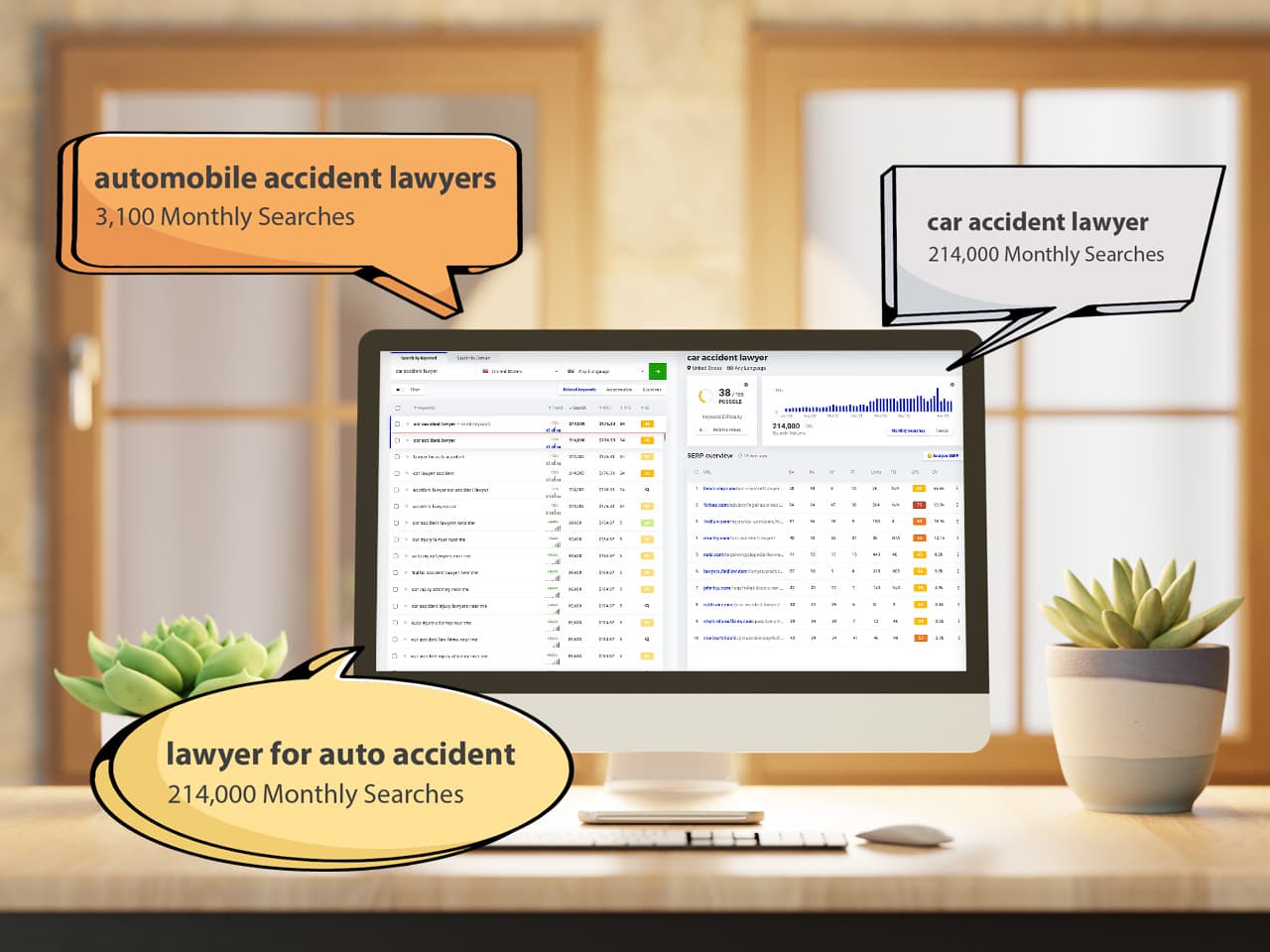In online marketing, one major cornerstone for success is keyword research. Understanding its significance is paramount for law firms to enhance their online visibility, reach their target audience, and acquire their ideal caseload. Let’s delve into why keyword research is indispensable for legal marketing strategies, how to conduct it effectively, and how to use it.
What is Keyword Research, and Why is it Important?
Keyword research is understanding the language of your target audience within the digital realm. Just as with real-life conversations, the right words can make all the difference. People use keywords to articulate their needs and find solutions online. For law firms, this means discerning the phrases potential clients use when seeking legal assistance. By aligning your content with these keywords, you're more likely to appear in relevant search results, driving traffic to your website.
For example, a person facing a legal issue will likely turn to Google for answers. They may search for terms like "divorce lawyer near me" or "personal injury attorney in [city]." By conducting keyword research, law firms can identify these search queries and tailor their content to meet the needs of their prospective clients.
Keyword Research
Search Volume
What Does Keyword Research Do?
Utilizing keyword research as a multifaceted digital marketing tool offers law firms invaluable insights and strategic direction for their digital marketing strategies.
Keyword research plays a pivotal role in ensuring search demand. It acts as a litmus test, gauging interest and inquiry surrounding specific legal topics or services. By delving into search volume data, law firms can ascertain whether there's substantial demand for the subjects they intend to cover in their content. This verification process is crucial for directing resources effectively, ensuring that time and effort are appropriately invested in creating content that resonates with a receptive audience. Aligning content with prevalent search queries positions law firms to capture organic traffic and potential leads actively seeking information or assistance in their areas of expertise.
Keyword research also serves as a guiding compass in shaping a law firm's content strategy. By meticulously identifying relevant keywords, firms gain clarity on the topics, issues, and questions that matter most to their target audience. This insight enables them to tailor their content creation efforts with precision, crafting articles, blog posts, guides, and other resources that directly address the concerns and interests of their potential clients. Whether it's simplifying complex legal concepts, offering practical advice, or providing updates on recent developments in the legal landscape, keyword-driven content ensures that law firms remain attuned to the needs and preferences of their audience. Strategically incorporating keywords into their content enhances firms’ visibility in search engine results, amplifying their online presence and authority within their respective legal niches.
In essence, keyword research serves as both a compass and a roadmap for law firms navigating the digital terrain. By leveraging the insights from search data, firms can chart a course that aligns with their target audience's interests, inquiries, and search behaviors. From validating demand for specific topics to shaping a cohesive content strategy, keyword research empowers law firms to engage with potential clients effectively, establish thought leadership in their fields, and, ultimately, drive growth and success in the competitive digital landscape.
Three Elements to Consider in Law Firm Keyword Research
Effective keyword research hinges on three essential elements, each contributing to the success of a law firm's digital marketing efforts: relevance, authority, and volume.
Relevance: At the core of keyword research lies the concept of relevance. Keywords must mirror the firm's legal services and resonate with its target audience's needs and queries. Understanding the intent behind specific search queries is vital to identifying relevant keywords. For instance, if a law firm specializes in family law, keywords such as "child custody lawyer" or "divorce attorney" are directly relevant to their practice area. By aligning keywords with the firm's expertise and the concerns of potential clients, law firms can ensure that their content addresses pertinent issues and attracts qualified leads.
Authority: Choosing keywords also significantly establishes the firm's authority within the legal domain. Opting for keywords that reflect the firm's expertise and specialization reinforces its credibility and enhances its visibility among competitors. For example, a firm renowned for its prowess in intellectual property law might target keywords like "patent attorney" or "copyright lawyer." By consistently associating these keywords with high-quality, informative content, the firm reinforces its authority in the eyes of both search engines and prospective clients, positioning itself as a trusted resource within its niche.
Volume: While relevance and authority are paramount, search volume is equally crucial in effective keyword research. Balancing search volume with competition ensures that law firms target keywords with a realistic chance of ranking well in search results. Pursuing highly competitive keywords with immense search volume may prove challenging for smaller firms or those with limited resources. Instead, focusing on long-tail keywords or niche-specific terms can yield more manageable competition while attracting relevant traffic. For instance, targeting long-tail keywords like "immigration attorney in [specific city]" or "estate planning lawyer for small businesses" allows firms to capture highly motivated leads without facing massive competition. By striking the right balance between search volume and competition, law firms can optimize their keyword strategy for maximum impact and visibility in search engine results pages (SERPs).
Using Keywords for SEO
Optimizing various elements of your website with relevant keywords is akin to fine-tuning an instrument for optimal performance in the digital symphony of search engine results. By strategically placing keywords in critical areas, law firms can orchestrate a harmonious blend of content and SEO, enhancing their visibility and resonance with their audience. Here's a closer look at where these keywords can be deployed:
URLs: Incorporating keywords into website URLs communicates the page's content to search engines, making it more user-friendly and memorable for visitors. For instance, a page addressing "personal injury claims" could feature a URL like www.lawfirm.com/personal-injury-claims.
Atlas & Vanguard Legal Associates Title Tag
Atlas & Vanguard Legal Associates - Premier legal representation & counsel. Expertise, integrity, and personalized solutions. Meta Description
Title Tags: Title tags are a webpage's headline in search results and web browsers. By including relevant keywords in title tags, law firms can capture the attention of both search engines and users, increasing the likelihood of clicks and engagement. For example, a title tag optimized for "business litigation services" might read "Qualified Business Litigation Services | XYZ Law Firm."
Meta Descriptions: Meta descriptions briefly summarize a webpage's content beneath its title in search results. While not a direct ranking factor, incorporating keywords into meta descriptions can improve click-through rates by signaling relevance to users. Crafting compelling meta descriptions that include targeted keywords can entice users to click through to the website for more information.
Page Titles: Like title tags, page titles are prominent indicators of a webpage's content. By including keywords in page titles, law firms can reinforce the topical relevance of their content and attract the attention of search engines and users browsing search results.
Subheadings: Subheadings, or H2 and H3 tags, break up content and provide structure for readers. By incorporating keywords into subheadings, law firms can signal the thematic relevance of different sections within their content, making it more scannable and digestible for users and search engines alike.
Body Content: The body content of a webpage offers ample opportunities to integrate keywords while providing valuable information to users naturally. By strategically weaving keywords into informative and engaging content, law firms can satisfy search intent and user needs, enhancing their authority and relevance in their respective legal domains.
Image Alt Tags: Image alt tags, or alternative text descriptions, provide context for web page images and are essential for accessibility and SEO. Including relevant keywords in alt tags helps search engines understand the content of images and improves the webpage's overall relevance.
By leveraging these strategic placements of keywords across various elements of their website, law firms can optimize their online presence for maximum visibility, relevance, and engagement in search engine results.

Using Keywords for SEO
Keyword mapping serves as the blueprint for a law firm's content strategy, aligning topics and themes with identified keywords to create a cohesive and targeted approach to content creation. This strategic process involves categorizing keywords based on relevance, search intent, and audience preferences, guiding the development of content that resonates with the firm's target audience. Here's how law firms can leverage keyword research to develop an effective content strategy:
Keyword Categorization: Begin by categorizing keywords into themes or topics relevant to the firm's areas of practice and target audience's interests. For example, "personal injury law" keywords might be grouped under one category, while those about "estate planning" could fall under another.
Identifying Search Intent: Analyze the search intent behind each keyword to understand users' underlying motivations and needs. Are they seeking information, legal assistance, or comparing different services? By aligning content topics with the search intent behind targeted keywords, law firms can ensure their content effectively addresses their audience's specific needs and queries.
Content Mapping: Once keywords are categorized and search intent is identified, map out content topics and formats that align with each keyword group. This may involve creating blog posts, articles, guides, videos, or other content assets tailored to address the interests and concerns reflected in keyword research.
Optimizing Content Creation: As content is developed, integrate targeted keywords naturally and strategically throughout the text, headings, and metadata. Ensure that content provides valuable information, answers common questions, and addresses relevant legal issues, all while seamlessly incorporating targeted keywords to enhance its visibility and relevance in search results.
Monitoring and Iteration: Continuously monitor content performance based on keyword relevance, search rankings, and user engagement metrics. Analyze which topics and keywords resonate most with the audience and adjust the content strategy accordingly to capitalize on emerging trends and opportunities.
Using keyword mapping as a guiding framework for content strategy development, law firms can create purposeful and impactful content that attracts, informs, and engages their target audience, ultimately driving meaningful interactions and conversions.
Keyword Research Tips
Effective keyword research is both an art and a science, requiring a nuanced understanding of audience behavior, search trends, and industry dynamics. Here are some valuable tips to enhance the efficacy of keyword research for law firms:
Understand Audience Intent: Delve deep into your target audience's motivations and needs to uncover the specific keywords and search queries they use to find legal services or information. Consider the context behind each keyword and tailor your content strategy accordingly to address user intent effectively.
Incorporate Primary Keywords Strategically: Identify primary keywords that encapsulate your law firm's core topics or services and strategically incorporate them across various website elements, including URLs, title tags, meta descriptions, and body content. However, avoid keyword stuffing and prioritize natural, user-friendly language to maintain readability and authenticity.
Stay Updated with Industry Trends: Monitor evolving legal trends, search algorithm changes and user behavior shifts to adapt your keyword strategy accordingly. Conduct keyword research regularly to identify emerging topics, capitalize on new opportunities, and stay ahead of the competition in online marketing's dynamic landscape.
Explore Long-Tail Keywords: While broad keywords may attract higher search volume, they often face fierce competition. Instead, explore long-tail keywords—more specific, niche phrases—that may have lower search volume but higher conversion rates. Long-tail keywords can help law firms target highly qualified leads with particular needs or inquiries, maximizing the effectiveness of their keyword strategy.
Utilize Keyword Research Tools: Use various keyword research tools and analytics platforms, such as Google Keyword Planner, SEMRush, and Ahrefs, to gather valuable insights into search volume, competition, and related keywords. These tools offer invaluable data and metrics to inform your keyword strategy and optimize your content for maximum visibility and impact.
By integrating these tips into their keyword research practices, law firms can refine their digital marketing strategies, enhance online visibility, and effectively connect with their target audience in the competitive legal industry.
Long-Tail Keywords
Primary Keyword
How Often Should I Do Keyword Research?
Regular keyword research is essential to staying aware of shifting trends and evolving search behaviors, but it needs to be done at a fixed frequency. The frequency depends on factors like industry dynamics and the firm's marketing goals.
How to do Local Keyword Research
Local keyword research is a cornerstone of digital marketing for law firms aiming to connect with clients in their immediate vicinity. Unlike broader keyword strategies, which cast a wide net to capture a global audience, local keyword research zeroes in on location-specific search queries that resonate with individuals seeking legal services within a specific geographic area. Here's a closer look at how law firms can effectively conduct local keyword research to bolster their online visibility and attract local clientele:
Identifying Geographic Targets: The first step in local keyword research is identifying the geographic regions or markets that the law firm serves. Whether it's a city, county, state, or region, pinpointing the firm's primary geographic targets lays the foundation for effectively targeting location-specific keywords.
Understanding Local Search Intent: Local keyword research hinges on understanding the unique search intent of individuals seeking legal services within a specific area. Users often include location qualifiers in their search queries to find nearby businesses or professionals. For example, they may search for terms like "divorce lawyer in [city]" or "personal injury attorney near me." Law firms can tailor their keyword strategy to align with local searchers' needs and preferences by discerning the nuances of local search intent.
Utilizing Location-Specific Keywords: With insights into local search intent, law firms can identify location-specific keywords relevant to their target geographic area. These keywords may include the names of cities, neighborhoods, landmarks, or other geographical identifiers pertinent to the firm's location. For instance, a law firm in Los Angeles might target keywords like "Los Angeles immigration lawyer" or "West Hollywood employment attorney" to capture local search traffic effectively.
Integrating Keywords Across Website Elements: Once location-specific keywords are identified, law firms should strategically integrate them across various website elements to optimize for local search visibility. This includes incorporating keywords into URLs, title tags, meta descriptions, page titles, subheadings, body content, and image alt tags. By aligning website elements with location-specific keywords, law firms signal relevance to search engines and increase their chances of appearing prominently in local search results.
Optimizing Local Listings and Directories: In addition to website optimization, law firms should optimize their presence on local listings and directories, such as Google My Business, Yelp, and local chamber of commerce websites. Ensuring that business information is accurate, consistent, and up to date across these platforms enhances local search visibility and fosters trust and credibility among local searchers.
Leveraging Localized Content: Creating localized content tailored to the interests and concerns of the firm's target geographic area can further bolster local search visibility. This may include writing blog posts, articles, or FAQs that address legal topics or issues specific to the local community. Law firms can establish themselves as trusted authorities within their local market by addressing local concerns and showcasing expertise in relevant legal matters.
Monitoring and Measuring Performance: As with any digital marketing strategy, monitoring and measuring the performance of local keyword optimization efforts is essential for ongoing refinement and improvement. Law firms should track key metrics such as local search rankings, organic traffic, and conversion rates to gauge the effectiveness of their local keyword research and adjust their strategy as needed.
By following these steps and embracing a localized approach to keyword research, law firms can strengthen their online presence, increase visibility among local searchers, and, ultimately, attract more clients from their target geographic area. Local keyword research isn't just a strategy—it's a powerful tool for connecting law firms with the clients who need their services most in their local community.
Unlock Your Law Firm’s Digital Marketing Potential with Legal Communications Group
Keyword research is the core of law firms' effective digital marketing strategy. By understanding their audience's language, needs, and search behavior, firms can optimize their online presence, attract relevant traffic, and convert leads into clients. Embracing the nuances of keyword research empowers law firms to navigate the competitive digital landscape with confidence and purpose.
However, you likely prioritize cases over keyword research when running a law firm. At Legal Communications Group, we’ve got that covered. Legal marketing is all we do at our full-service ad agency. We have a proven track record of transforming legal brands and crafting our clients' custom-tailored digital strategies that convert.
Contact us today by submitting a form online or giving us a call at 215-364-8828 to get the conversation started.







